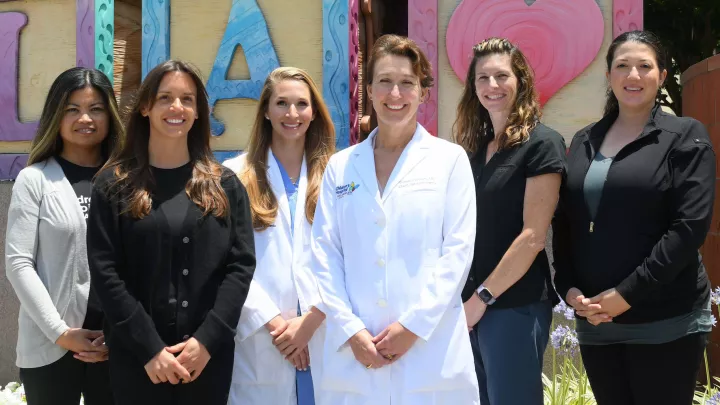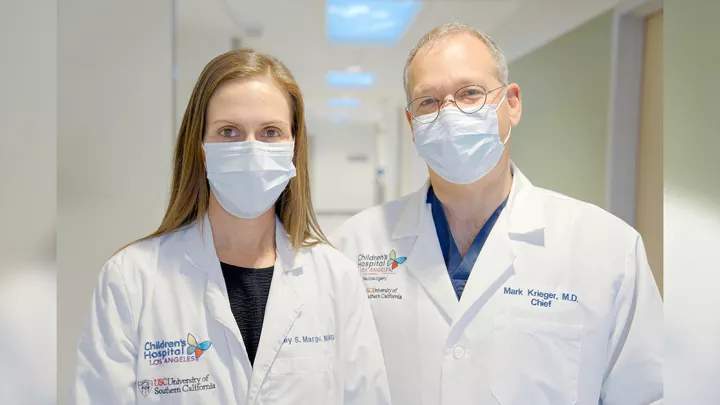Inpatient Rehabilitation Center
The new Margie and Robert E. Petersen Foundation Rehabilitation Center honoring Bobby and Richie Petersen offers unrivaled patient care in a new space that integrates families into a child’s recovery from traumatic injury or life-threatening illness.
Why CHLA?
The 22,000-square-foot, safari-themed Petersen Rehabilitation Center is one of the largest acute pediatric rehabilitation centers in the country. It has 22 patient beds and features 16 private rooms, three semiprivate rooms, and two medical isolation rooms for patients with fragile immune systems. The Center also provides a greater range of amenities and innovative technologies. It features 1,750 square feet of physical and occupational therapy space in the rehabilitation gym, as well as an occupational therapy craft room, a speech therapy room, a recreation therapy room, a private treatment room, a Child Life playroom and access to the hospital’s existing hydrotherapy room.
Center Highlights
Every patient room has family sleep areas, a bathroom and shower, free wireless Internet and the GetWellNetwork®, an interactive patient care system developed for pediatric patients and their families that lets them learn and play while in the hospital. Some rooms and the gym include innovative ceiling-mounted transportation systems to help safely move patients. The Center also has a kitchen equipped for patient therapy activities and a large common area that encourages communal dining.
Our Expertise
The Petersen Rehabilitation Center provides coordinated care—through nursing, physical and occupational therapy, hearing and speech therapy, social work and Child Life—for children with some of the most complex and diverse diagnoses, including stroke, brain and spinal cord injuries, brain tumors, bone tumors, seizures, spinal disorders and rheumatologic disorders.
What to Expect
- Patients are seen daily by a physiatrist
- Each patient receives three hours of therapy a day, six days per week
- Therapy takes place in a therapeutic environment rather than in patient rooms
- Patients are encouraged to have meals in the dining room with their peers
- Patients wear standard clothing and tennis shoes. Hospital gowns are not generally worn in the Rehabilitation Center
- Patients are provided with daily schedules, which include therapeutic services, school and special events
Our Services
- Nursing
- Occupational therapy
- Physical therapy
- Speech and language pathology
- Social work
- Child Life services
- Music, art, dance and movement therapy
- School
- Animal-assisted therapy
- Educational planning
- Massage therapy
Commonly Treated Conditions
- Acute inflammatory demyelinating polyradiculoneuropathy (AIDP)
- Brain injury
- Brain and spinal cord tumors
- Chronic inflammatory demyelinating polyneuropathy (CIDP)
- Encephalopathy
- Feeding and swallowing disorders
- Guillian-Barré syndrome
- Hypertonicity/spasticity
- Leukemia
- Lymphoma
- Movement disorders
- Multiple traumas
- Musculoskeletal disorders
- Neuromuscular disease
- Orthopedic
- Rheumatologic disorders
- Spina bifida
- Spinal cord injury
- Stroke and neurologic disorders
Referrals
Refer a Patient for Inpatient Rehabilitation
Please fax the following information to 323-361-3649:
- Face sheet
- History and physical examination
- Recent progress notes
- Recent therapy notes
Primary criteria for admission to the Rehabilitation Center:
- Patient must be medically stable
- Patient must have baseline developmental/functional milestones prior to illness or injury
- Patient must be able to participate in three hours of therapies a day
- Patient must be authorized for admission by the health care coverage provider
- Patient must require 24-hour nursing care
More Information
Discharge Services
Our staff is dedicated to providing our patients and families with transitional services. Prior to discharge we provide:
- Family training for mobility, transfers and feeding
- Referrals for recommended outpatient therapy services
- Locations of outpatient therapy sites
- Finalization of adaptive equipment needs
- Planning for return to school
- Possible home evaluations for high-risk patients and families
Therapeutic Pass
A therapeutic pass to take patients off the hospital’s campus is provided toward the end of a patient’s stay, if authorized by the rehabilitation team and the insurance company. This is designed to assist in preparing for children to return home, allowing families to practice what they have learned during their child’s rehabilitation. Families are asked to note questions and issues that come up during their outing. Upon their return, patients and families discuss their experience with therapists, nurses and social workers and continue to build the skills needed for a safe discharge home.
Transitional Services
Patients are followed in our outpatient Physical Medicine and Rehabilitation Clinic after discharge from the inpatient rehabilitation program, for continuity of care with a physiatrist. Our physiatrists use rehabilitation interventions to maximize daily function and quality of life for children and teens with impairment/disabilities after discharge from in-patient rehabilitation. They work to improve children’s over all development, by assessing functional, cognitive, psycho-social, educational, and equipment needs.
Outpatient Therapy Services
Outpatient Therapy Services are also available once patients are ready to go home, including:
How to refer a patient for outpatient therapy
A doctor’s order is required for evaluation and treatment in any of the specialties listed above. All orders should include:
- The primary diagnosis
- Additional diagnoses requiring evaluation/treatment
- The specialty desired for evaluation and treatment
- A request for a dysphagia evaluation, if a feeding evaluation is desired
- Precautions (cardiac, spinal, feeding, etc.)
Outcomes
2023 Overview and Outcomes - Margie and Robert E. Peterson Foundation Rehabilitation Center


